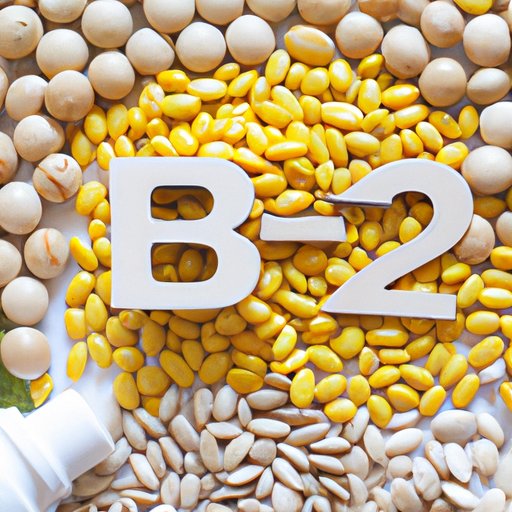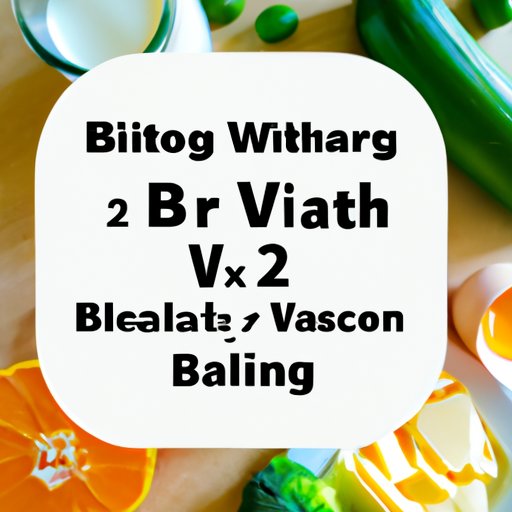
Introduction
Vitamin B12 is an essential nutrient that the body needs to function properly. And although it is available in many foods, many people still aren’t getting enough of it. In this article, we’ll discuss everything you need to know about vitamin B12 – why it’s crucial for health, how much you should be getting, and most importantly, what foods to eat to ensure you’re getting enough of it.
Why Vitamin B12 is Essential and How to Get Enough of It in Your Diet
Vitamin B12 plays a critical role in keeping your body’s nerve and blood cells healthy and helps make DNA, the genetic material in all cells. It also prevents a type of anemia called megaloblastic anemia that makes people tired and weak. Adults should aim for 2.4 micrograms of this vitamin per day.
To get enough B12 from the diet, you need to eat foods that contain it. The best sources are animal foods like meat, fish, eggs, and dairy products. Fortified breakfast cereals are also a good source of vitamin B12 these days, and supplements are another option.
Top 10 Foods That Are Rich In Vitamin B12: A Comprehensive List
Here are the top 10 foods that are rich in vitamin B12, along with their nutritional content:
- Clams: One 3-ounce serving provides 84.1 micrograms of vitamin B12, or 1,402% of your daily value (DV).
- Beef liver: 3 ounces of beef liver contains 70.7 micrograms of vitamin B12, or 1,178% of your DV.
- Tuna: 3 ounces of cooked tuna contain 2.5 micrograms of vitamin B12, or 42% of your DV.
- Cottage Cheese: 1 cup of cottage cheese contains 1.64 micrograms of vitamin B12, or 27% of your DV.
- Sardines: 3 ounces of canned sardines provide 6.6 micrograms of vitamin B12, or 110% of your DV.
- Egg: One whole egg provides 0.6 micrograms of vitamin B12, or 10% of your DV.
- Fortified cereal: One cup of fortified cereal provides 6 micrograms of vitamin B12, or 100% of your DV.
- Fortified Soy Milk: One cup of soy milk provides 3 micrograms of vitamin B12, or 50% of your DV.
- Fortified Nutritional Yeast: One tablespoon of nutritional yeast provides 1.4 micrograms of vitamin B12, or 23% of your DV
- Chicken: Three ounces of cooked chicken contain 0.3 micrograms of vitamin B12, or 5% of your DV.
A Guide to Foods That Can Help You Boost Your Vitamin B12 Intake
In addition to the top 10 foods listed above, there are other options to boost your vitamin B12 intake. Try incorporating these foods into your daily meals:
- Brazil nuts: 1 ounce contains 0.17 micrograms of vitamin B12, or 3% of your DV.
- Salmon: 3 ounces of cooked salmon provides 4.9 micrograms of vitamin B12, or 82% of your DV.
- Fortified almond milk: One cup of almond milk provides 1 microgram of vitamin B12, or 16% of your DV.
- Milk: 1 cup of whole milk contains 1.2 micrograms of vitamin B12, or 20% of your DV.
- Yogurt: One cup of plain yogurt contains 1.4 micrograms of vitamin B12, or 23% of your DV.
- Mussels: 3 ounces of cooked mussels provides 20.4 micrograms of vitamin B12, or 340% of your DV.
- Ground beef: 3 ounces of cooked lean ground beef contains 1.3 micrograms of vitamin B12, or 23% of your DV.
- Chicken liver: 3 ounces of cooked chicken liver contains 9.3 micrograms of vitamin B12, or 155% of your DV.
- Pork chops: 3 ounces of cooked pork chops contain 0.8 micrograms of vitamin B12, or 13% of your DV.
Vitamin B12: The Powerhouse Nutrient Found in These Everyday Foods
It’s not just animal products that contain vitamin B12! Here are some commonly consumed foods that also contain vitamin B12:
- Fortified cereals and oatmeals: Check labels for vitamin B12 content.
- Fortified plant-based milk: Almond milk, soy milk, and other plant-based milks are often fortified with vitamin B12.
- Nutritional yeast: This cheesy-tasting seasoning is fortified with vitamin B12.
When looking at food labels, be sure to check for vitamin B12 content. Foods that have 20% or more of your daily value of this nutrient are considered a good source. Foods that have less than 5% may not be a significant source of vitamin B12.

Eating Your Way to a Healthy Vitamin B12 Intake: Tips and Tricks
Incorporating vitamin B12-rich foods into your diet doesn’t have to be complicated or time-consuming. Here are some tips to help:
- Start your day with a vitamin B12-rich breakfast: Eat fortified cereal or have a nutritional yeast or egg scramble in the morning.
- Snack on vitamin B12-rich foods: Cottage cheese, hard-boiled eggs, and sardines are all easy and nutritious snack options.
- Get creative with dinner: Cook with salmon, beef liver, or mussels for a vitamin B12 boost.
- Switch up your milk: Try swapping your regular milk for fortified almond or soy milk.
How Vegetarians and Vegans Can Get Enough Vitamin B12 from Their Diet
Vegetarians and vegans can struggle to get enough vitamin B12 from their diet alone, because this vitamin primarily comes from animal products. However, there are ways to get enough B12 without resorting to supplements.
Vegetarians can meet their B12 needs by eating fortified foods like breakfast cereals, plant-based milk, and nutritional yeast. They can also consume eggs and dairy products if they choose. But for vegans, it may be harder because there are very few plant sources of vitamin B12.
To ensure they are getting enough vitamin B12, vegans should look for fortified foods, occasional use of vitamin B12-fortified foods and supplements.
Conclusion
Vitamin B12 is an essential nutrient that plays a crucial role in overall health and well-being. By incorporating vitamin B12-rich foods into your diet, you can ensure that you are getting enough of this important vitamin. Whether you’re a meat-eater, vegetarian, or vegan, there are plenty of options to choose from.





